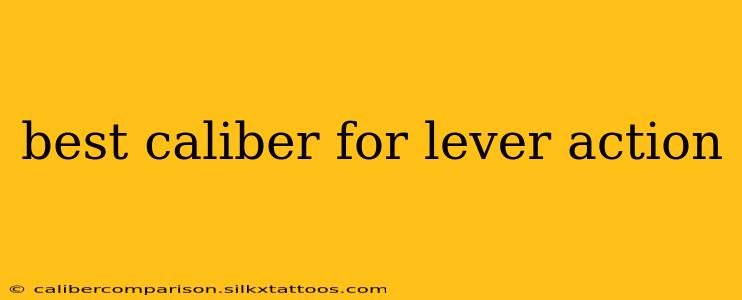Choosing the right caliber for your lever-action rifle depends heavily on its intended use. Whether you're hunting deer in dense woods, plinking at the range, or defending your home, the optimal caliber will vary significantly. This guide will delve into the popular choices, highlighting their strengths and weaknesses to help you make an informed decision.
Understanding Caliber Considerations
Before diving into specific calibers, let's consider the key factors influencing your choice:
- Intended Use: Hunting large game requires a powerful round, while smaller game or target shooting calls for something less potent. Home defense needs a balance of stopping power and manageable recoil.
- Range: Longer-range shooting necessitates flatter-shooting cartridges with less bullet drop.
- Recoil: Heavier calibers produce more recoil, potentially affecting accuracy and shooter comfort, especially for less experienced shooters.
- Availability of Ammunition: Ensure the chosen caliber's ammunition is readily available and affordable in your region.
- Rifle Design: Some lever-actions are better suited for certain calibers than others. Check your rifle's specifications to ensure compatibility.
Popular Lever Action Calibers and Their Applications:
.30-30 Winchester:
- Strengths: Widely available, relatively inexpensive ammunition, manageable recoil, good accuracy at moderate ranges, effective on deer-sized game. A classic and proven deer hunting cartridge.
- Weaknesses: Limited range compared to some other calibers, less effective against larger game at longer distances.
.45-70 Government:
- Strengths: Extremely powerful, excellent for large game hunting (bear, elk), substantial stopping power for home defense.
- Weaknesses: Significant recoil, limited magazine capacity in most lever-actions, expensive ammunition, not ideal for long-range shooting.
.44 Magnum:
- Strengths: Powerful cartridge suitable for large game (with appropriate bullet selection), good stopping power for self-defense, readily available ammunition. Versatile cartridge usable in revolvers and rifles.
- Weaknesses: Moderate to high recoil, depending on the load, not as flat-shooting as some other calibers.
.357 Magnum:
- Strengths: Manageable recoil, versatile, relatively inexpensive ammunition, suitable for small to medium-sized game, a viable option for home defense. Can also utilize .38 Special ammunition.
- Weaknesses: Less powerful than other calibers discussed, limited effectiveness on larger game.
.223 Remington / 5.56 NATO:
- Strengths: Flat-shooting, accurate, relatively low recoil, suitable for varmints and smaller game. Ammunition is widely available and affordable.
- Weaknesses: Less effective against larger game than other calibers listed.
Making the Right Choice
The "best" caliber is subjective and depends entirely on your individual needs and preferences. Consider the factors outlined above and carefully weigh the pros and cons of each caliber before making your decision. Visiting a shooting range and trying out different calibers with similar rifles is highly recommended to get a feel for recoil and accuracy. Talking to experienced hunters and shooters can also provide valuable insight.
This guide provides a starting point for your research. Further investigation into specific lever-action rifles and their recommended calibers is encouraged before making a purchase. Remember, safety should always be your top priority when handling firearms.

